The 14th Africa Lecture held by CAI
Date : Apr.01, 2024
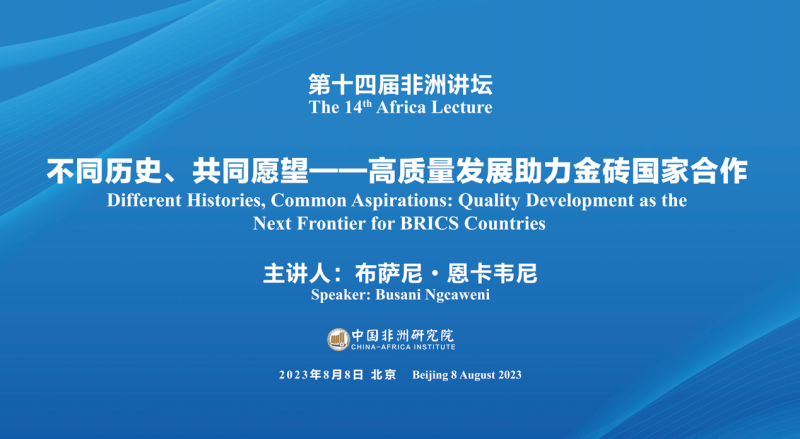
The 14th Africa Lecture was held online and offline by China-Africa Institute (CAI) on August 8, 2023 under the theme “Different Histories, Common Aspirations: quality development as the next frontier for BRICS Countries” . Professor Busani Ngcaweni, the Principal of the National School of Government, senior research fellow at the University of Johannesburg was invited to deliver a keynote speech. Professor Wang Xiaoming, vice-president of the CAI presided over the lecture.
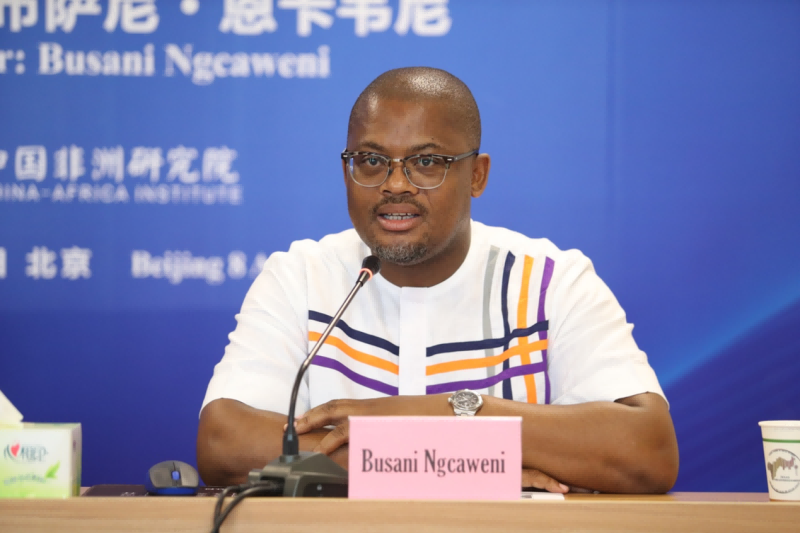
Professor Busani is delivering speech
Professor Ngcaweni talked about the partnership for prosperity through BRICS (Brazil, Russia, India, China and South Africa) with a focus on the evolution of China-Africa relationship, opportunities and challenges for Global South and the new frontiers for changes.
Professor Ngcaweni pointed out that despite of differences in development pathways, China and Africa have been enjoying mutual friendship founded on shared values and a desire for prosperity for all. China-Africa cooperation underlines the principle of extensive consultation, joint contribution and shared benefits, upholding multilateralism for achieving mutual benefit and win-win outcomes. China has been taking an active part in global governance and constantly pursuing opening policies, which has helped to boost South-South cooperation.
Professor Ngcaweni said, the biggest challenge for the Global South is dealing with poverty and inequality which is as a result of some factors: weak institutions, energy security, climate change, skills gaps, unemployment and so on. In terms of economic development, in order to promote industrialization and digital technology, Africa must strive to maintain safety in energy access, invest more in internet infrastructure and mitigate the effects of climate change while maintaining a decent growth rates.
Moreover, the continent’s education systems and skills training programs need urgent reform to ensure young people have the skills required for current and future employment. When talked about trade and economic cooperation, Professor Ngcaweni conveyed his idea that Africa should push forward multilateral structures of foreign trade and drive development in diverse markets, while exploring pathways for added value of export goods.
China has been promoting FOCAC (the Forum on China-Africa Cooperation) since 2000 and contributed positively to Africa's development. Professor Ngcaweni expressed, BRICS and FOCAC are similar in their framework, and both play an vital role in promoting regional stability and development. He hoped to see greater infrastructure cooperation between China and Africa, and expected that the debt issue could be solved via financial aid.
Finally, Professor Ngcaweni shed light on the new frontiers for change. He presented that Global South countries should build state capacity to effectively manage state affairs and deliver socio-economic services to the people. Self-serving bureaucracies should be replaced with dynamic, innovative, ethical and competent bureaucrats and politicians who demonstrates greater levels of mastering statecraft. While investing more in vocational training and building better skills for workers in industrial sector, BRICS countries also need to accelerate technology transfer.
BRICS countries should speed energy transit to ensure diversified foreign capital inflows in the sector, and encourage settlement of accounts through local currency thus increasing their tradability. Professor Ngcaweni underlined that BRICS and the Global South need to intensify efforts to increase trade among themselves and promote people-to-people exchanges. The academic institutions in BRICS countries should strengthen cooperation in scientific research, and contribute to the implementation of national policies.
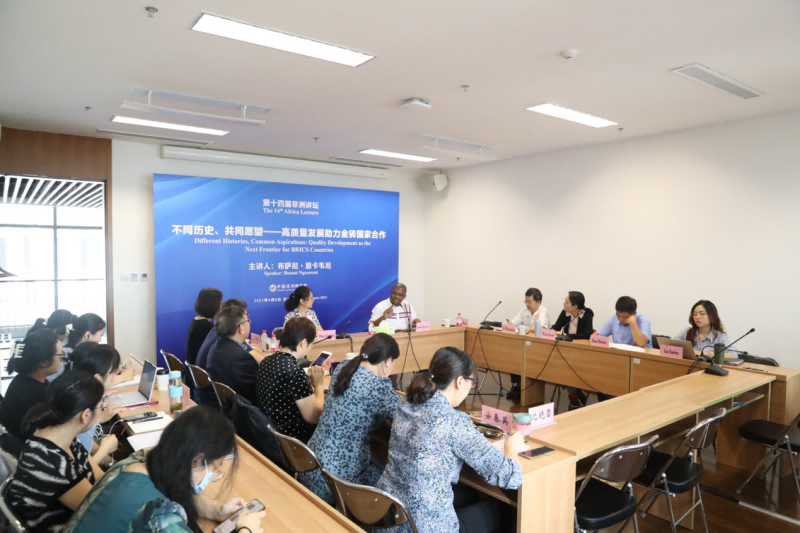
Main venue of the lecture
In the Q and A session, Professor Ngcaweni and scholars of CAI had an in-depth discussion on topics related to BRICS Summit, Africa’s foreign relations, and the Global South studies. Professor Liu Naiya, director of Social and Cultural Studies Division of CAI, Professor Li Wengang, director of Ethical and Religious Studies Division of CAI, and Professor An Chunying, associate editor of Journal of West Asia and Africa and other scholars participated in the session.
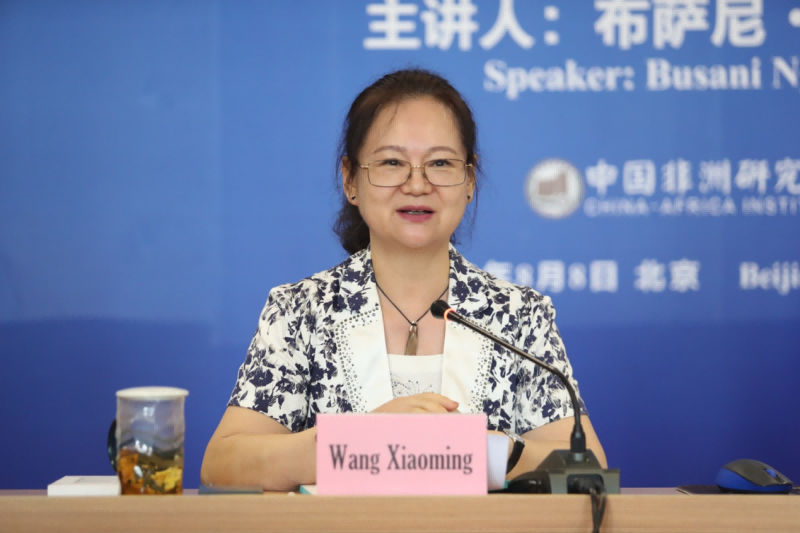
Professor Wang Xiaoming presided over the lecture
In the conclusion speech, professor Wang Xiaoming appreciated Professor Ngcaweni for his wonderful speech. She said, Professor Ngcaweni briefed on the changes and opportunities for current international relations, offering a great inspiration for Chinese scholars to conduct studies in this field.
Professor Ngcaweni pointed out that although the Global South countries are differ in history, politics, economic development and culture, they are facing common challenges in their development paths, and share common aspiration for prosperity, this has made them join hands to promote cooperation and communication.
Professor Wang Xiaoming said, CAI has signed a MOU with the National School of Government, University of Johannesburg to organize international conferences and seminars. On June this year, CAI held the 15th China Lecture in South Africa, which is a model for future cooperation between Chinese and African think tanks and scholars. CAI will continue to work with African think tanks and scholars to enhance China-Africa cooperation, and strive for mutual benefit and win-win cooperation.
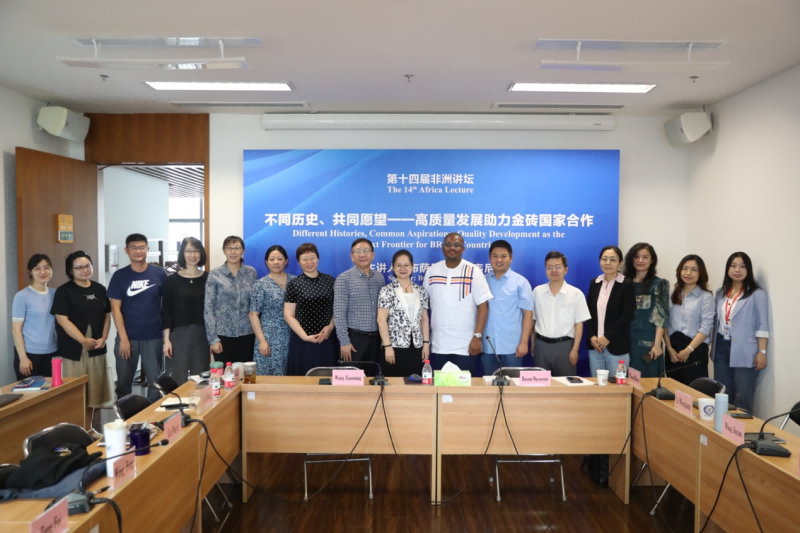
The lecture was attended by more than 50 scholars and experts from CAI online and offline. It was held two weeks ahead of the 15th BRICS Summit which was scheduled for August 22-24, 2023 in South Africa.
(Photo by Dong Jiacheng)


